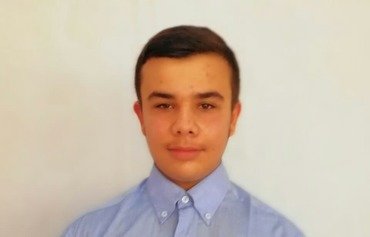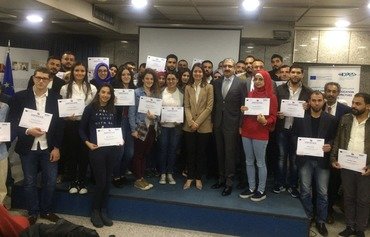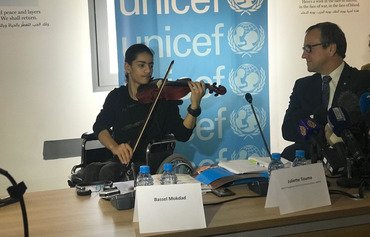Syria's ongoing war and the "Islamic State of Iraq and the Levant" (ISIL) incursion into Iraq have crushed the dreams of numerous university students, though some have been able to find opportunity amid adversity.
While many refugees from Syria and Iraq hope to complete their university education and start building their careers in Lebanon, most have been forced to suspend their education and enter the workforce.
Relatively few are on course to achieve their academic dreams.
Dalia Saad Boulos, a 20-year-old Chaldean who was displaced from the Iraqi city of Mosul in 2014, told Al-Mashareq she had hoped to become a pediatrician.
She now works as a sales attendant at a cotton products shop in Beirut's Sad el-Bouchrieh district, but is still determined to achieve her dream, even if it takes her longer than she had expected.
"We lived in peace in my city, Mosul, and our life was normal until it was occupied by the 'Islamic State of Iraq and the Levant' (ISIL)," she said.
"We had to leave, first to the Kurdish region and from there to Lebanon, where we settled in a small house in the Sabtiyeh district," she said. "We experienced poverty and were deprived of almost everything."
Today, Boulos lives with her parents, three brothers and sister, and she and her sister Marie work in the same shop to help their family pay their rent and for the treatment of one of her brothers who is ill.
Leaving dreams behind
"I left my home, my dream and my future in Mosul," Boulos said.
"I had just finished high school and was getting ready to enroll at a university to specialise in medicine when ISIL occupied the city," she said.
In Lebanon, the family has been subsisting on what they can earn and on bi-monthly food aid provided by the Chaldean Diocese of Beirut, Boulos said.
The family registered with the UN High Commissioner for Refugees (UNHCR) as soon as they arrived in Lebanon, but "have yet to receive our cards", she added.
"My current circumstances prevent me from enrolling in any university in Lebanon to specialise in medicine," she said. "I thought of doing it so many times, but the college tuition is beyond my family's financial means."
Boulos, however, is determined to realise her dream of becoming a doctor and said she hopes to be able to do humanitarian work once she qualifies.
"I am seeking a grant to travel abroad to complete my university studies and achieve my dream," she said. "I will be a doctor one day."
Changing course
Despite the challenges they face, a number of Syrian youth have managed to fulfill some of their ambitions, such as human rights activist Mohammed Hassan.
"I was pursuing my academic specialisation in computer programming at the Damascus Information Technology Institute when the revolution broke out," Hassan, 25, told Al-Mashareq.
"The events in Syria forced me to leave to Beirut in 2013, and face radical changes in my life," he said. "My dream of earning an engineering degree has so far been thwarted, despite originally coming to Lebanon to complete my education."
Forced to abandon his studies, Hassan turned his attention to developing "my favorite hobby, journalism, as I have dreamed since childhood of documenting people's stories and conveying them to the world".
"The war changed my dreams," he said. "Instead of being a computer programming engineer, I am in a totally different profession."
"I started by cleaning cafés, washing dishes and delivering food orders while also working in the media field as a freelance journalist," he said. "I covered refugee news and took part in human rights campaigns."
Hassan was just recently granted a scholarship by a private Lebanese university to pursue his studies in radio and television, he said.
"As the old saying goes, 'Every cloud has a silver lining'," he said, noting that faced with his new reality, he had no choice but to make a change.
"I had to make up my mind or waste away my life," he said.
Documenting the war
The Syrian war also altered the course of the life of Homs native Jaafar Mousa, 24, who had been enrolled at the University of Homs when the war broke out.
"The outbreak of the revolution forced change upon me, and I found myself at the cusp of realising my dream of becoming a journalist, but in a different way, namely through documenting via the media the start of activism in Syria," he told Al-Mashareq.
Mousa became a freelance documenter of the military escalation in Homs, especially in the Baba Amr, then Old Homs and al-Waar districts, he said. "I documented the events with my cell phone and was arrested three times."
"Afterwards, I began to document the forced displacement and demographic change in Homs," he said, adding that circumstances later led him to flee his homeland for Lebanon.
"I left to Lebanon and settled there, and after six years of working as a media professional, I was finally able to enroll [in a university] and pursue a specialisation in radio and television," Mousa said.
"Despite all the circumstances around me, I was able to proceed with my studies and work in the profession I love," he said.

![Human rights activist Mohammed Hassan, 25, a Syrian refugee, takes part in a training session at Voice of Lebanon Radio. [Photo courtesy of Mohammed Hassan]](/cnmi_am/images/2017/04/28/7758-Lebanon-journalist-training-600_384.jpg)






